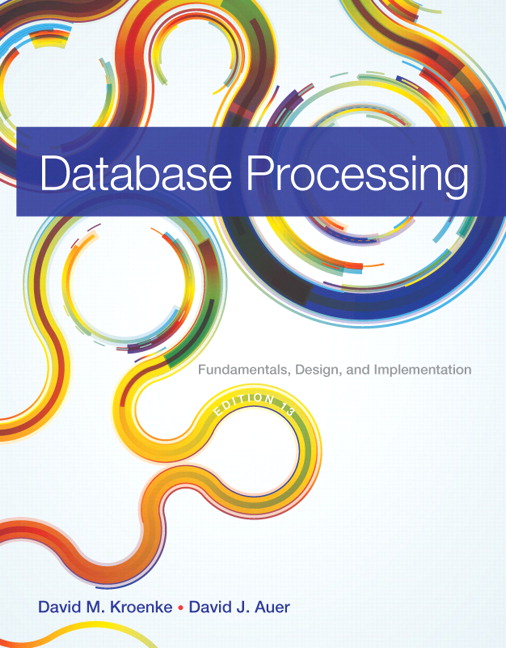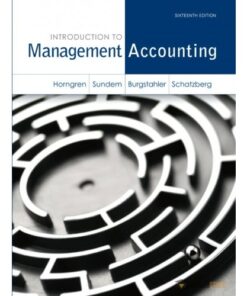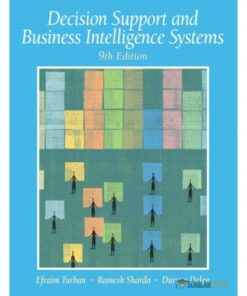Test bank for Database Processing: Fundamentals, Design, and Implementation, 13/E 13th Edition David M. Kroenke, David J. Auer
$35.00
Test bank for Database Processing: Fundamentals, Design, and Implementation, 13/E 13th Edition David M. Kroenke, David J. Auer
Database Processing, 13e (Kroenke/Auer)
Chapter 1: Introduction
1) The purpose of a database is to help people keep track of things.
Answer: TRUE
Diff: 1 Page Ref: 3
2) In a database, each table stores data about a different type of thing.
Answer: TRUE
Diff: 1 Page Ref: 3
3) In a database, each row in a spreadsheet has data about a particular instance.
Answer: FALSE
Diff: 2 Page Ref: 3
4) In every database, not just the databases discussed in this book, table names are capitalized.
Answer: FALSE
Diff: 2 Page Ref: 3
5) A database shows data in tables and the relationships among the rows in those tables.
Answer: TRUE
Diff: 1 Page Ref: 4
6) Data is recorded facts and figures; information is knowledge derived from data.
Answer: TRUE
Diff: 1 Page Ref: 5
7) Databases record data in such a way that they can produce information.
Answer: TRUE
Diff: 2 Page Ref: 6
8) Enterprise Resource Planning (ERP) is an example of a data mining application.
Answer: FALSE
Diff: 2 Page Ref: 6-7
9) Databases are a key component of e-commerce order entry, billing, shipping and customer support.
Answer: TRUE
Diff: 2 Page Ref: 7
10) The largest databases in e-commerce are the order entry databases.
Answer: FALSE
Diff: 3 Page Ref: 7
11) The e-commerce companies use Web activity databases to determine which items on a Web page are popular and successful.
Answer: TRUE
Diff: 2 Page Ref: 7
12) Small databases typically have simple structures.
Answer: FALSE
Diff: 3 Page Ref: 8
13) A database system is typically defined as its four components: users, database applications, the DBMS and the databases.
Answer: TRUE
Diff: 1 Page Ref: 8
14) A database system as typically defined can be modified to include CODASYL.
Answer: FALSE
Diff: 1 Page Ref: 8
15) Applications are computer programs used directly by users.
Answer: TRUE
Diff: 1 Page Ref: 9
16) In a database system, applications write data to the database.
Answer: FALSE
Diff: 1 Page Ref: 9
17) Sequenced Query Language (SQL) is an internationally recognized standard language that is understood by all commercial database management system products.
Answer: FALSE
Diff: 2 Page Ref: 8
18) In database systems, indexes are held by the database.
Answer: TRUE
Diff: 3 Page Ref: 8-13 Fig 1-14
19) A database management system (DBMS) creates, processes and administers databases.
Answer: TRUE
Diff: 1 Page Ref: 11
20) The database management system (DBMS) is responsible for inserting, modifying, reading, and deleting data.
Answer: TRUE
Diff: 1 Page Ref: 11
21) The database application is responsible for concurrency control.
Answer: FALSE
Diff: 3 Page Ref: 12
22) The database management system (DBMS) is responsible for enforcing referential integrity constraints.
Answer: TRUE
Diff: 1 Page Ref: 12
23) Referential integrity constraints are rules about what data values are allowed in certain columns.
Answer: TRUE
Diff: 1 Page Ref: 12
24) A database is a self-describing collection of non-integrated tables.
Answer: FALSE
Diff: 2 Page Ref: 12
25) Integrated tables store both data and the relationships among the data.
Answer: TRUE
Diff: 2 Page Ref: 12
26) Microsoft Access is just a DBMS.
Answer: FALSE
Diff: 2 Page Ref: 14
27) Microsoft Access is a low-end product intended for individuals and small workgroups.
Answer: TRUE
Diff: 2 Page Ref: 14
28) The current DBMS engine in Microsoft Access is called ADE.
Answer: TRUE
Diff: 2 Page Ref: 14
29) In Microsoft Access, you can use the Oracle DBMS in place of the ADE DBMS.
Answer: FALSE
Diff: 2 Page Ref: 15
30) In an Enterprise-class database system, a database application interacts with the DBMS.
Answer: TRUE
Diff: 2 Page Ref: 15 Fig 1-16
31) In an Enterprise-class database system, a database application accesses the database data.
Answer: FALSE
Diff: 2 Page Ref: 15 Fig 1-16
32) In an Enterprise-class database system, business users interact directly with the DBMS, which directly accesses the database data.
Answer: FALSE
Diff: 2 Page Ref: 15 Fig 1-16
33) All database applications get and put database data by sending SQL statements to the DBMS.
Answer: TRUE
Diff: 2 Page Ref: 8
34) The DBMS ranked as having the “most power and features” in the text is IBM’s DB2.
Answer: FALSE
Diff: 3 Page Ref: 16 Fig 1-17
35) The DBMS ranked as being the “most difficult to use” in the text is Oracle Corporation’s Oracle Database.
Answer: TRUE
Diff: 3 Page Ref: 16 Fig 1-17
36) The DBMS ranked as being the “easiest to use” in the text is Microsoft’s SQL Server.
Answer: FALSE
Diff: 2 Page Ref: 16 Fig 1-17
37) The DBMS ranked as having the “least power and features” in the text is Microsoft Access.
Answer: TRUE
Diff: 2 Page Ref: 16 Fig 1-17
38) A database is called “self-describing” because it reduces data duplication.
Answer: FALSE
Diff: 2 Page Ref: 12
39) The description of a database’s structure that is stored within the database itself is called the “metadata.”
Answer: TRUE
Diff: 1 Page Ref: 12 Fig 1-14
40) In a database processing system, indexes are held by the database management system (DBMS).
Answer: TRUE
Diff: 3 Page Ref: 13 Fig 1-12
41) Database design is important, and fortunately it is simple to do.
Answer: FALSE
Diff: 1 Page Ref: 17
42) A database design may be part of a new systems development project.
Answer: TRUE
Diff: 1 Page Ref: 17-19 Fig 1-18
43) A database design is rarely a redesign of an existing database.
Answer: FALSE
Diff: 1 Page Ref: 17-19 Fig 1-18
44) Information systems that stored groups of records in separate files were called file processing systems.
Answer: TRUE
Diff: 2 Page Ref: 21-23 Fig 1-25
45) Data Language/I (DL/I) structured data relationships as a tree structure.
Answer: TRUE
Diff: 3 Page Ref: 21 Fig 1-25
46) The CODASYL DBTG mode structured data relationships as a tree structure.
Answer: FALSE
Diff: 3 Page Ref: 23 Fig 1-25
47) The relational model was first proposed in 1970 by E. F. Codd at IBM.
Answer: TRUE
Diff: 2 Page Ref: 23
48) The 1977 edition of this text contained a chapter on the relational model, and that chapter was reviewed by E. F. Codd.
Answer: TRUE
Diff: 3 Page Ref: 23
49) dBase was the first PC-based DBMS to implement true relational algebra on a PC.
Answer: FALSE
Diff: 3 Page Ref: 24
50) Paradox is the only major survivor of the “bloodbath of PC DBMS products.”
Answer: FALSE
Diff: 2 Page Ref: 24
51) Business organizations have resisted adopting object-oriented database systems because the cost of purchasing OODBMS packages is prohibitively high.
Answer: FALSE
Diff: 3 Page Ref: 24
52) Bill Gates has said that “XML is the lingua-franca of the Internet Age.”
Answer: TRUE
Diff: 2 Page Ref: 25
53) XML Web services allow database processing to be shared across the Internet.
Answer: TRUE
Diff: 2 Page Ref: 25
54) The NoSQL movement should really be called a NoRelational movement.
Answer: TRUE
Diff: 2 Page Ref: 24
55) Twitter and Facebook use NoSQL databases.
Answer: TRUE
Diff: 2 Page Ref: 25
56) The purpose of a database is to:
A) help people keep track of things.
B) store data in tables.
C) create tables of rows and columns.
D) maintain data on different things in different tables.
E) All of the above.
Answer: A
Diff: 2 Page Ref: 3
57) A database stores:
A) data.
B) relationships.
C) metadata.
D) A and B
E) A, B, and C
Answer: E
Diff: 2 Page Ref: 3-4 and 12
58) A database records:
A) facts.
B) figures.
C) information.
D) A and B
E) A, B, and C
Answer: D
Diff: 2 Page Ref: 3
59) A sales contact manager used by a salesperson is an example of a(n) ________.
A) single-user database application
B) multiuser database application
C) e-commerce database application
D) A or B
E) Any of A, B, or C
Answer: A
Diff: 2 Page Ref: 8 and Fig 1-5
60) A Customer Resource Management (CRM) system is an example of a(n) ________.
A) single-user database application
B) multiuser database application
C) e-commerce database application
D) A or B
E) Any of A, B, or C
Answer: B
Diff: 2 Page Ref: 8 and Fig 1-5
61) An online drugstore such as Drugstore.com is an example of a(n) ________.
A) single-user database application
B) multiuser database application
C) e-commerce database application
D) A or B
E) Any of A, B, or C
Answer: C
Diff: 1 Page Ref: 7 Fig 1-5
62) The industry standard supported by all major DBMSs that allows tables to be joined together is called ________.
A) Sequential Query Language (SQL)
B) Structured Question Language (SQL)
C) Structured Query Language (SQL)
D) Relational Question Language (RQL)
E) Relational Query Language (RQL)
Answer: C
Diff: 1 Page Ref: 8
63) A program whose job is to create, process and administer databases is called a ________.
A) Database Modeling System
B) Database Management System
C) Data Business Model System
D) Relational Model Manager
E) Data Business Management Service
Answer: B
Diff: 2 Page Ref: 8
64) Microsoft Access includes:
A) a DBMS.
B) an application generator.
C) a Web server.
D) A and B
E) A, B, and C
Answer: D
Diff: 2 Page Ref: 14 Fig 1-15
65) Microsoft Access may use which of the following DBMS engines?
A) ADE
B) SQL Server
C) Oracle
D) A and B
E) A, B, and C
Answer: D
Diff: 2 Page Ref: 14
66) Which of the following are basic components of an enterprise-class database system?
A) The user
B) The database application
C) The database management system (DBMS)
D) The database
E) All of the above
Answer: E
Diff: 1 Page Ref: 15-16 Fig 1-16
67) In an enterprise-class database system, ________.
A) the database application(s) interact(s) with the DBMS
B) the database application(s) access(es) the database data
C) the DBMS accesses the database data
D) A and B
E) A and C
Answer: E
Diff: 2 Page Ref: 15-16 Fig 1-16
68) In an enterprise-class database system, the database application ________.
A) creates queries
B) creates forms
C) creates reports
D) A and B
E) B and C
Answer: E
Diff: 2 Page Ref: 15-16 Fig 1-16
69) In an enterprise-class database system, reports are created by ________.
A) the user
B) the database application
C) the database management system (DBMS)
D) the database
E) All of the above
Answer: B
Diff: 2 Page Ref: 15-16 Fig 1-16












Reviews
There are no reviews yet.